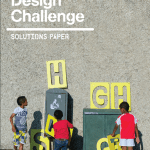A paper, authored by NEF Consulting, was published this week to present the results of a twelve-month evaluation of the three ventures that received final funding from the Knee High Design Challenge. It is focused on the outcomes achieved by these three teams in terms of their achievements on the programme and the impact that their products and services are having on child health.
Design Council and Guy’s and St Thomas’ Charity have invested in imaginative and effective interventions that will make a lasting difference to children’s early years. NEF Consulting worked with them to evaluate the social and economic impact of new services and products for children under five years old.
The Knee High Design Challenge Solutions paper, is an abridged version of the complete report.
The Knee High Design Challenge shows local authorities and policymakers how new services or products can evidence that they are raising the health and wellbeing of residents within their communities. It also provides learning about the role of innovation and design in improving outcomes for children in their early years. For investors and entrepreneurs, it illustrates the extent and the ways investments can make a change to health outcomes and how to test and evidence the impact of innovative work.
Pointers for local authorities and policymakers
- Use existing public spaces creatively to encourage families to leave the house. Innovative approaches to using public space and changing the everyday environment can engage families more effectively and help them to reconsider normal routines.
- Find ways to use day-to-day play to connect with families and encourage children’s learning and development. Innovations that use a playful approach engage young children directly, support learning and activity, and can be successful in supporting families where more traditional service delivery models have struggled.
- Build on what is already happening locally and involve local people in making change. Tailored interventions based on a strong understanding of local needs and assets promote a sense of ownership that supports long-term outcomes.
Pointers for investors and entrepreneurs
- Innovative funding models like the Knee High Design Challenge can mitigate investment risk and improve health outcomes from ventures. This works by creating a structured environment which enables entrepreneurs to test their ideas and investors to spread their investment risk.
- Embed an evaluation culture throughout the process. This is important to understand better how a venture has impact over time, and in what areas. This can help when looking for additional funding.
- Think about your model of change as there is no ‘one-size-fits-all’ solution. Entrepreneurs should reflect on the change they are trying to create, and choose their model accordingly.
- Networks and contacts are as important as funding.Networks are incredibly important to social enterprises and startups, giving access to information, resources, expertise and support in areas they might be lacking.
 Knee High Design Challenge was launched in September 2013 with the aim of catalysing and supporting innovative services or products that improve the health and wellbeing of children under five in Southwark and Lambeth. Following an open call for ideas, 25 teams were selected for support and mentoring through a staged funding process. Six teams from the 25 were awarded £51,000 each to develop and refine their business model. These were then each given the opportunity to pitch for further funding. In the autumn of 2014, three teams received further funding of up to £100,000 each to run a twelve month evaluated pilot of their work in Southwark and Lambeth. The three successful funded teams were Creative Homes, KidsConnect and Pop up Parks.
Knee High Design Challenge was launched in September 2013 with the aim of catalysing and supporting innovative services or products that improve the health and wellbeing of children under five in Southwark and Lambeth. Following an open call for ideas, 25 teams were selected for support and mentoring through a staged funding process. Six teams from the 25 were awarded £51,000 each to develop and refine their business model. These were then each given the opportunity to pitch for further funding. In the autumn of 2014, three teams received further funding of up to £100,000 each to run a twelve month evaluated pilot of their work in Southwark and Lambeth. The three successful funded teams were Creative Homes, KidsConnect and Pop up Parks.
Creative Homes
Creative Homes is an experiential home visiting service that uses trained early years artists to identify and solve everyday stresses in the home. The Creative Homes team is a collective of specially trained dancers, designers, early years specialists, musicians, sound artists, storytellers, chefs and visual artists. They provide simple, playful solutions designed to give families a helping hand towards building lasting, positive routines, and equip caregivers with the confidence and capability to make lasting change to habits and behaviour.
By relieving day-to-day stress in the home and making everyday life easier, Creative Homes aims to unlock the barriers to families seeking and accessing support they might need in the future.
KidsConnect
KidsConnect has developed an app that puts parents and carers in touch with accurate, comprehensive and easily accessible information about activities and support available for children under five living in Lambeth and Southwark. This is to ensure that no child misses out on activities because their parents or carers lack knowledge or networks. The aim is to help parents to access information so that they can decide what is right for them.
KidsConnect promotes local community assets and local people gaining knowledge about their physical and community environment.
Pop up Parks
Pop up Parks creates vibrant space in urban environments that encourage children and families to spend more time being playful, creative and active outside the home. The programme quickly transforms underused urban places into playful outdoor environments for children, their parents
and carers. These spaces are where families live and where they spend time near to, or within, housing estates and on community streets. Pop up Parks is a group of educationalists, designers and
fabricators.
Pop up Parks provides a new local space that encourages children and families to spend more time being playful and creative outside the home. Ultimately the programme looks to transform public space more permanently and to inspire a new way of thinking about urban space and outdoor play.
The evaluation
 NEF Consulting was commissioned to deliver the evaluation of the pilot in partnership with Narativ, an organisation that has researched, developed and refined methods for listening and storytelling. The evaluation focuses on the journey of the three final funded teams and provides insights into the benefits of early intervention programmes for under-fives.
NEF Consulting was commissioned to deliver the evaluation of the pilot in partnership with Narativ, an organisation that has researched, developed and refined methods for listening and storytelling. The evaluation focuses on the journey of the three final funded teams and provides insights into the benefits of early intervention programmes for under-fives.
The ventures were directly involved in the design and delivery of the evaluation process to embed an evaluation culture within their teams. For each venture the starting point was to develop a variety of ‘Theory of Change’ models highlighting the short, medium and long-term outcomes that the ventures anticipate for different stakeholders. Data was collected through direct project activities and through surveys sent out to participants. Narativ worked with each team to develop an approach to embed story gathering in activities.
The evaluation highlighted the ways in which different interventions have varying degrees of success in improving health, development and wellbeing outcomes in children under five and their families in Southwark and Lambeth. It also highlighted how the teams were able to adapt their approaches in different ways based on initial results and feedback.
For more information download the Solution paper here
Related articles:
Local early action: How to make it happen
